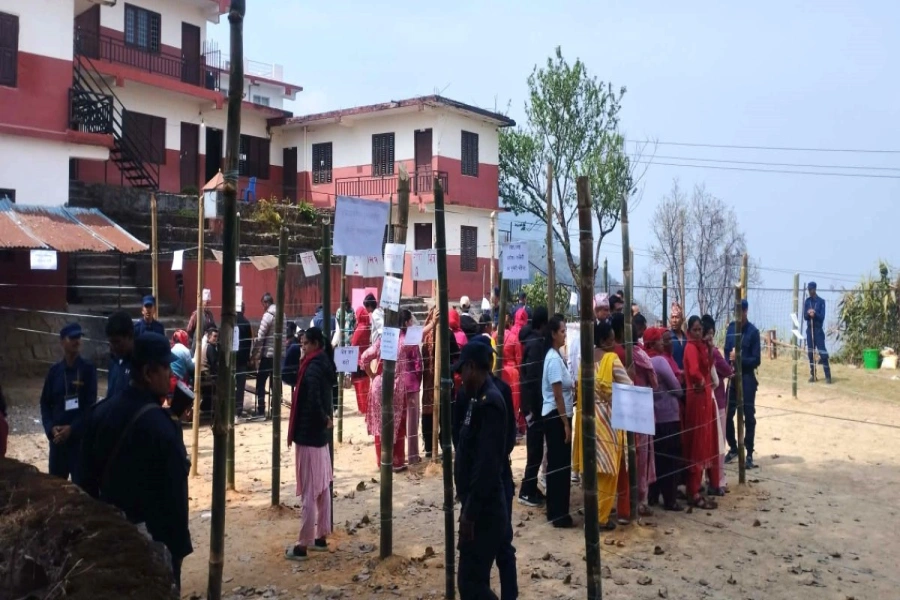PHNOM PENH, July 30: Cambodia’s ruling party won an expected victory in an election Sunday widely considered illegitimate after the only credible opposition was silenced and which ensures that long-ruling Prime Minister Hun Sen will serve another five-year term.
Although 20 parties contested the election, the only one with the popularity and organization to mount a real challenge, the Cambodian National Rescue Party, was dissolved last year by the Supreme Court in a ruling generally seen as political.
Government spokesman Khieu Kanharith confirmed to The Associated Press that the Cambodian People’s Party had topped the polls. He did not say how many of the of the 125 seats in the National Assembly the CPP had captured, but preliminary totals broadcast on state television showed that the party had won at least 70 percent of the vote in each of the country’s 25 provinces. Under the election’s system of proportional representation, the party would likely grab more than 100 seats.
Local and foreign rights groups, along with several Western governments, had agreed that the election would not be credible.
The United States said it regretted the flawed vote and wound consider its responses, including expanding on visa restrictions that were announced in December. The statement from the White House press secretary’s office said the U.S. was disappointed in the government’s choice to disenfranchise voters, citing the exclusion of the principal opposition party, the jailing and banning of its officials, and threats to punish non-voters.
The disbanded CNRP’s former leaders had urged people not to vote in what was dubbed a “Clean Finger” campaign because those who did cast ballots had to dip a finger in indelible ink, a practice meant to thwart multiple voting.
Cambodians vote in polls with main opposition party silenced

According to detailed totals released by the state National Election Committee, more than 6.8 million registered voters, or 82.2 percent, cast ballots.
The figure, if correct, would suggest that the promotion by opposition forces of a poll boycott was ineffective. In the last general election in 2013, voter turnout was 6.6 million, or 68.5 percent of 9.7 million registered voters.
Hun Sen said on his Facebook page before the results were announced that he welcomed the big turnout, and congratulated his countrymen for exercising their right to vote.
However, threats had previously been reported against anyone planning to boycott. In rural areas where the majority live, someone who didn’t vote — recognized by the lack of ink on their fingers — might have been subject to retaliation by local officials who carry out civic functions, such as land registration.
Voters in Phnom Penh, Cambodia’s capital and an opposition stronghold, were less susceptible to such threats because of their higher visibility and safety in numbers. However, according to the election committee, even there the turnout was about 80 percent.
Doubts are likely to be raised about the actual turnout because several established poll-watching groups — as well as contingents from the United States and the European Union — declined to take part in polls they viewed as illegitimate. One of the bigger Cambodian groups watching the polls is led by one of Hun Sen’s sons.
Following the election, exiled opposition leader Sam Rainsy called for peaceful protests, calling it “a sham election with a foregone conclusion.”
Speaking from south of Paris in Freteval where he lives, Sam Rainsy told The Associated Press that “it is a meaningless victory because (Hun Sen) won without any real challenger ... prior to the election he dissolved the only credible opposition party.”
Hun Sen’s Cambodian People’s Party was alarmed by the results of the 2013 election, when the race was close enough for the opposition to claim that it would have won had the voter registration process not been manipulated.
Along with fracturing the political opposition — including pressuring Sam Rainsy into exile and jailing his successor, Kem Sokha — Hun Sen’s government also silenced critical voices in the media. Over the past year, about 30 radio stations shut down, and two English-language newspapers that provided serious reporting were gutted, one forced to close and the other put under ownership friendly to the government.
Just ahead of the polls, the government ordered the temporary blocking of 17 websites, citing regulations prohibiting media from disseminating information that might affect security. The blocked websites included those of the U.S. government-funded Voice of America as well as local media.
Hun Sen, whose 33 years in power make him among the world’s longest-serving national leaders, promised peace and prosperity at a campaign rally Friday, but attacked the opposition’s boycott call and called those who heed it “destroyers of democracy.”
Hun Sen, 65, has said he intends to stay in power for at least two more five-year terms.
He was a member of the radical communist Khmer Rouge during its successful five-year war to topple a pro-American government, then defected to Vietnam during Khmer Rouge leader Pol Pot’s 1975-79 genocidal regime that left nearly 2 million Cambodians dead. He became prime minister in 1985 in a Vietnamese-backed single-party communist government and led Cambodia through a civil war against the Khmer Rouge, which eased off with the 1991 Paris Peace Accords that also installed a democratic political framework.




































